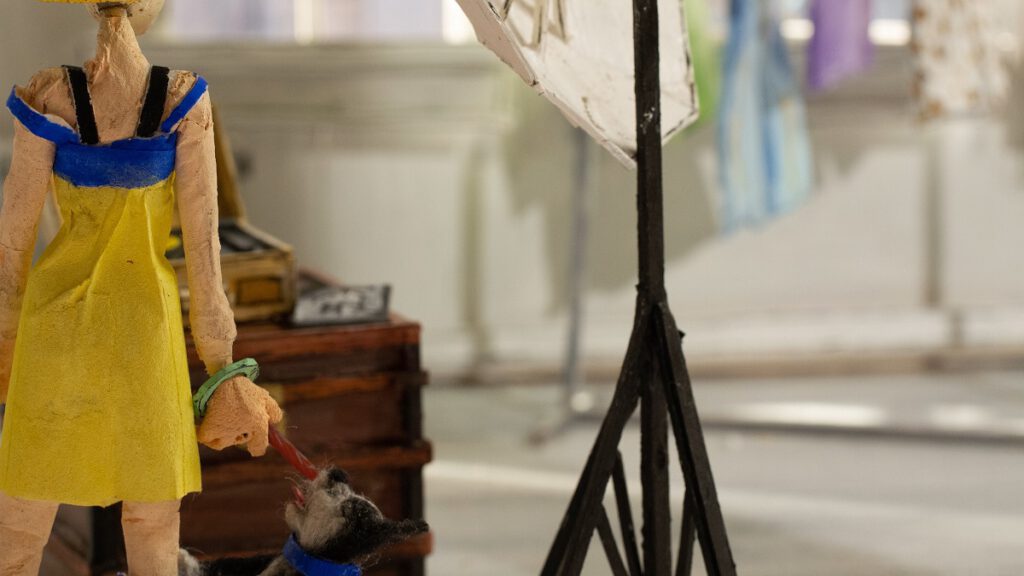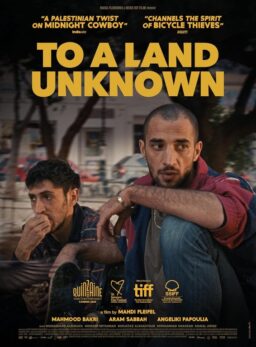Zach Dorn’s animated short film “Charlotte” covers a lot of ground in its 13 minutes that when it ends, you can’t really believe it’s over. It sets itself up for a feature, with multiple generations of a family unit coming to terms with the success of a pop song (the film’s title) written 50 years ago and which has now resurfaced in the form of a cover version by a contemporary artist. The woman who wrote the song, Lena Black (voiced by O-Lan Jones), has long been out of the spotlight, but who has two grown kids and a grandson named Eli (voiced by Devin Schlatter), who has songwriting ambitions of his own, much to the dismay of his mother (voiced by Phoebe Jane Hart), who would prefer he stay out of music business.
Dorn’s film gives us a clear view of these characters’ lives as the film jumps around in time. Lena Black’s frustration with a condescending interview on a talk show helps go a long way toward explaining her behavior around her own children, who, as adults, still try to sort through their experience of living with her and how that has informed their parenting. Eli records tapes for his estranged father (whom we never meet) because his own mother cannot come to terms with his interest in music. He’s writing songs that kids write at this age and is fiercely proud of them (it’s weird, but “Dog Patient Dog” will stay in your head more than the snippets of “Charlotte” that we get to hear).
The animation/puppetry style works well for this material, especially in this era of short films when using puppetry and animation is often employed for documentary reenactments (see “Shots In the Dark WIth David Godlis” from a few months ago, just one example). I’ve become so accustomed to this approach, it actually made me look up to see if these people were actually real. I somehow never tire of this tactile method. The story feels lived-in and incredibly personal, but Dorn is working from scratch and has great affection for his characters, warts and all. The imperfections of the animation style compliment the messy lives these characters currently lead. It magically draws us in closer.
The film reminded me of the novels of Nick Hornby (About A Boy and Juliet, Naked, in particular) and Dorn is equally wise about the role music plays in our personal lives and how it can come back to haunt us when we least expect it. Maybe someday, “Dog Patient Dog” will become a pop sensation, leaving a trail of happy fans and messy personal lives in its wake.

Q&A with director Zach Dorn
How did this come about?
“Charlotte” took shape after I heard the Carly Rae Jepsen cover of Joni Mitchell’s “Both Sides Now” while shopping at a department store in Santa Clarita, California. I’m not sure if you’re familiar with the Carly Rae Jepsen version, but it’s undeniably upbeat and catchy. The song is an unexpected interpretation of such a sentimental and melancholic masterpiece. For months, I imagined these two songs in conversation. There was something irreconcilable between them, a cavernous distance, but I couldn’t get over the sensation that Carly Rae Jepsen and Joni Mitchell were still singing the same song. This contradiction inspired the script and animation style.
Tell me about the animation process for you. It looks like a combination of stop-motion and puppetry.
I spent my twenties as a puppeteer, performing multimedia puppet shows in bowling alleys, drive-in movie theaters, and art galleries across North America. “Charlotte” is my first attempt to transform this live puppetry style into a film that is entirely stop-motion.
For the puppets, I collaborated with my friends Oliver Levine and Lily Windsor, and I fabricated all the sets and props in my one-bedroom apartment for about ten months. Then, during the first lockdown, I abandoned my mattress and transformed my 10’ x 10’ bedroom into a shooting space where I shot, animated, and edited the film.
We get a very clear view of this family, who they are and what they’re dealing with, from the past and present, with a new generation being directly affected by the music. Was it hard to whittle everything down to a 13 minute short?
I started the process by writing from the perspectives of about eight characters that had a connection to Lena Black’s original version of “Charlotte” and T.Y.M.’s cover. For example, I would spend a few days writing from the perspective of T.Y.M.’s manager and then switch to writing a pseudo-memoir from one of Lena Black’s ex-husbands. Eventually, Lena Black and T.Y.M.’s lives became incredibly real. Even now, I am often surprised Lena and T.Y.M. don’t actually exist. This clarity of their worlds made the writing process rather easy, but led to a script that was entirely too long. Since I was animating this film alone, I had to get something around 15 minutes. The whittling process was a real challenge.
There was something about Eli and Diane’s stories, although directly unrelated to the song, that captured the contradictions between T.Y.M. and Lena’s versions of “Charlotte.” Diane and Eli’s relationship felt like the perfect way to frame and contain the worlds of the two musicians. They both helped me shape the story into its final 13 pages.

There are so many themes rich with possibility here and the film accomplishes a lot. Are you interested in exploring more about the role music plays in our lives?
My parents were both failed musicians who became piano salespeople. While I grew up with pianos in my home, they represented a failure of my parents’ artistic ambitions and, after their divorce and decline of the home piano market, a failure of American middle class pursuits. For this reason, I am fascinated by the inner-live conflict of music, where a song might say one thing, but deliver something entirely different.
How did you go about casting the voices?
An actor who read for Lena Black was working with O-Lan Jones at the time and recommended her. I couldn’t believe it. I sent her the script, and O-Lan agreed. It was a bizarre coincidence, because O-Lan’s mom worked at Cafe Wha, which is featured in the film, and she spent a lot of time there growing up. Also, O-Lan is also an incredible musician herself.
She read the opening monologue over Zoom, and the character just sprung to life. I wanted to appear like I knew what I was doing, so I attempted to direct her and failed miserably. She knew exactly what she’s doing and, in some ways, probably knew Lena Black better than I did.
Devin Schlatter, who voices Eli, was the child of a friend of a friend. When I interviewed him on Zoom, he was such a mischievous kid. He kept pulling tricks on his mom, turning on face filters while we were talking, and she kept getting frustrated and embarrassed like he blowing the audition, but, really, he was killing it. And he has such an amazing, raspy voice!
What’s next for you?
Right now, I am hoping to find funding to create an experimental documentary about Livia Soprano and this genetic mutation called BRCA. In the film, I recreate family home videos through stop-motion animation and deep fake my dead mom’s face on a bunch of Italian American actresses as they cook her famous Italian stuffing recipe.












